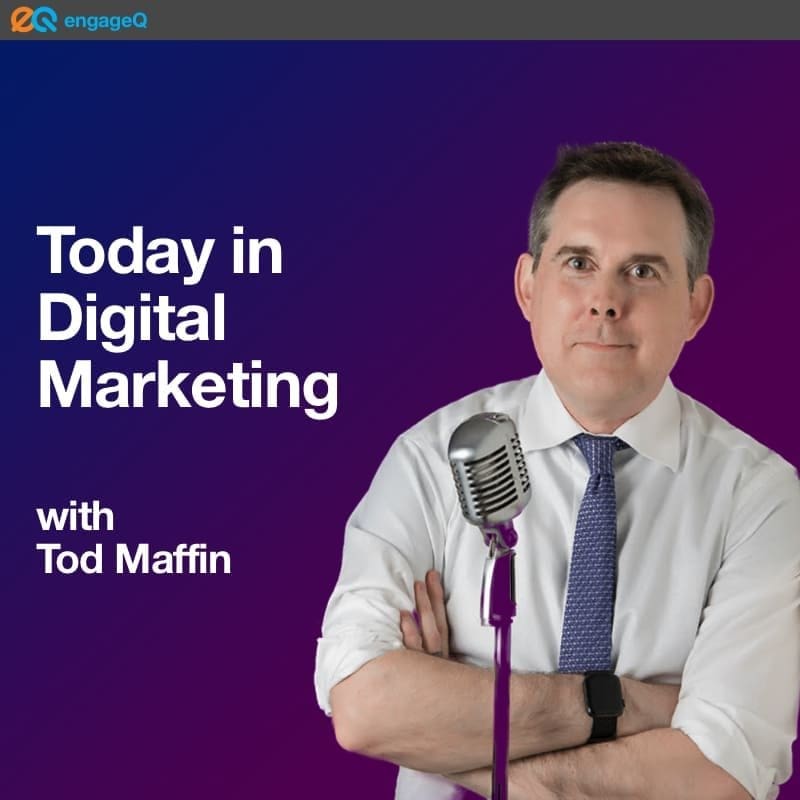BREAKING NEWS
A TikTok Cyberattack is Underway
Hackers are gaining access to large accounts through direct messages. Here's how you can lock your account down.
by Tod Maffin (email • LinkedIn • social media)
Today's News
TIKTOK • Hack Doesn’t Even Require Users to Click
SEARCH • Desktop-Only Sites Won’t Be Indexed
MICROSOFT • Video and CTV Now in Ads Editor
DTC • Flashy Banners Work Only For Some Products
PODCAST • Have Audiences Been Undercounted?
BUGS • YouTube’s Like Button is Disappearing
CHART OF THE DAY • Podcast Discovery
TIKTOK • Hack Doesn’t Even Require Users to Click
TikTok today confirmed it’s trying to shut down a cyberattack underway, so far targeting the accounts of large brands and creators.
It’s not clear if these attacks are linked, but accounts like CNN, Sony, and Paris Hilton have been affected. CNN’s account was offline for days after becoming a target.
No clicks required
The attempted breaches involve malware being sent as a Direct Message, and can affect the account owner’s ability to access their own TikTok profiles. What’s particularly frightening here is that this hack doesn’t require the user to download, click, or do anything other than opening the DM.
That’s different than the vulnerability Microsoft researchers found a few years back that let hackers take over accounts after someone clicked a malicious link in a DM.
It’s not clear what the hackers’ end-goal is, as none of the breached accounts have been used to post content.
We have taken measures to stop this attack and prevent it from happening in the future. We're working directly with affected account owners to restore access, if needed.
Jason Grosse, spokesperson, TikTok privacy and security team
It’s bad timing
It’s never a good time for a zero-day hack, but this seems to be a particularly bad time, especially given the American election coming this fall, and the potential ban of the app looming in the U.S.
How to secure your account
As for securing your own brand’s accounts, there are a few steps you can take.
Make sure that you review who has access to your accounts, through the TikTok business manager. And then, set a recurring task in your task manager to do this at least monthly.
It also might be worth looking at your own personal account and reviewing which apps you’ve authorized. Most marketing tools that connect to TikTok are fine, of course, but if you’re an early adopter and tend to try new things out a lot, you may want to delete connections to apps you’re not using.
Everyone who uses your brand’s or client’s TikTok account should have two-factor authentication turned on and login alerts enabled.
If your account does get hacked, TikTok has a web page with help on getting it back. You can also report DMs that seem sus.
SEARCH • Desktop-Only Sites Won’t Be Indexed
If your client or company still has a different web site for mobile users than it does for desktop users, your desktop site is about to relegated to irrelevance by Google.
First, a bit of history.
Back in the day, web sites were only made for desktop browsers, because that’s all there was. Once cell phones started being able to display web pages, the people who ran those sites realized their desktop sites looked terrible on phones. So they created separate, scaled-back web sites that would be shown to those early-adopters and their fancy web phones. This meant they had two web sites to maintain and update.
That was the norm for a couple of years, until responsive design became the norm — these sites would show full-width for desktop users, but would automatically collapse down for easier viewing when a smartphone was viewing it. This meant they only had one site to maintain… a smarter one that would adapt on the fly to the device viewing it. These responsive sites are what make up the vast majority of the web today.
But there were still some holdouts — companies that didn’t bother to ever go responsive, and still maintain separate sites for mobile and desktop. It’s that group that’s affected here.
What’s changing?
Google this week said it will stop indexing desktop-only sites entirely next month.
Google crawls and indexes almost all websites using a smartphone crawler. Over the years, the number of sites that aren't accessible on mobile has continued to shrink… After July 5, 2024, we'll crawl and index these sites with only Googlebot Smartphone.
If your site's content is not accessible at all with a mobile device, it will no longer be indexable.
Remember, this will only affect a very small number of web sites out there, but if your client or brand has a web site that can’t be viewed using a smartphone, you can expect it to disappear from Google’s search listings.
Exceptions and reporting
Google says it will maintain the desktop crawler for a couple of small edge cases, like product listings and job listings.
You can always double-check the status of your sites in Google by using the Google Search Console URL Inspection tool.
🎁 Everyone who guesses will be entered in our monthly draw for a full year of our Premium Newsletter free!
MICROSOFT • Video and CTV Now in Ads Editor
Microsoft has added Video and Connected TV (CTV) ads to its Ads Editor. This includes Netflix across 10 countries.
This move allows advertisers to manage video campaigns in bulk, streamlining the process to reach audiences… watching Netflix’s popular content and more
• Video and CTV ads now supported in Microsoft Advertising Editor
• Bulk campaign creation and direct video creative uploads
• Auto-created device targeting based on campaign type
• Netflix inventory available for CTV campaigns in U.S., Canada, Brazil, Mexico, U.K., France, Germany, Italy, Spain, and Australia
Unlock your career potential with Jelly Academy's Digital Marketing Bootcamp. Experience hands-on learning, industry-leading strategies, and prestigious certifications—all fully funded through scholarships brought to you by the Government of Canada, funded by Upskill Canada.
Seize this opportunity to transform your career with Canada’s leading employment-ready digital job skills trainer.
DTC • Flashy Banners Work Only For Some Products
So you're launching a 24-hour sale on your travel site. A pop-up banner and countdown announce the sale, complete with an animated airplane and flashing neon lights. Despite the attention-grabbing design, sales are lower than expected.
Some data published recently in the Journal of Business Research suggests those flashy ads might be the problem.
It depends on what you sell
For high-involvement purchases, like holidays or expensive gadgets, the researchers found it’s best to avoid dynamic banners (moving ads, countdowns). Static banners are better for those.
But for low-involvement purchases, like t-shirts or shampoo, dynamic banners can work well.
The specifics
Among their experiments, the researchers found:
A static banner offering a discount on laptops increased purchase intentions by 9.6%, while a dynamic ad had no effect.
When framed as a limited-time offer, 65% remembered the price with a static ad, but only 48% with a dynamic ad. The dynamic ad also lowered purchase intentions by 10.3%.
A low-involvement purchase example:
A countdown timer for electric toothbrushes reduced purchase intentions by 9.7% compared to a static banner.
Why does this happen?
The researchers speculate that dynamic banners grab attention, but they distract buyers from processing important information. This makes them less confident in their purchase.
The study used artificial environments, so real-world effects might vary. It focused on laptops, USB drives, and electric toothbrushes. Results may differ for other products.
The paper is called “Effect of dynamic promotion display on purchase intention”.
PODCAST • Have Audiences Been Undercounted?
People who measure podcast audiences as they relate to advertising may have been dramatically undercounting the reach.
This is one of the key findings from a Cumulus Media study released yesterday.
“Co-listening” not factored in
It found that more people than originally thought listen to podcasts with someone else. Think about a car ride where two people are listening. Using digital data points only — downloads, specifically — the podcast platform would count that as a single listener.
The only real way to measure actual listenership would be by surveying, or reaching an industry-wide accepted estimate. TV audience metrics, for instance, often assume multiple viewers.
The numbers
In the study, 14% of people surveyed said they frequently listen with someone else.
Genres like kids/family (31%) and rewatch podcasts (26%) see higher co-listening rates.
Mobile devices dominate podcast listening at 69%, but smart speakers (11%) and connected TVs (6%) are also used.
In cars, 17% of podcast time includes potential co-listeners.
Other findings
Side hustles are prevalent among heavy podcast consumers. Half report having a side gig, with men and video podcast viewers more likely to do so. Among 18-34-year-olds, 60% have a side hustle.
Most podcast consumption happens quickly, with 71% listening within 24 hours of release. Women and long-time listeners are more likely to revisit past episodes.
As for where they’re listening, this study found that YouTube leads as the top podcast platform, used by 31% of listeners, followed by Spotify (21%) and Apple (12%).
The study was conducted a couple of weeks ago, and polled more than 600 weekly podcast consumers.
RELATED:
BUGS • YouTube’s Like Button is Disappearing
A strange bug is being reported by some YouTube users — the thumbs-up Like button is disappearing after being clicked.
The Like still seems to be registered, but after clicking it, the button just vanishes and an empty grey space is left.
This seems to be a desktop issue, not mobile.
Some Reddit users reported a similar bug some months ago.
CHART OF THE DAY • Podcast Discovery
– 30 –
How to become a smarter marketer 🧠
If you’re a marketer looking to constantly up your game or a founder who wants to make sure they’re nailing their growth, this is one free resource you absolutely need to be taking advantage of.
Stacked Marketer is the industry insider newsletter that gives marketers an edge over the competition. Covering breaking industry news, tips and tricks for almost every marketing channel including Google, Facebook, Native, SEO, and more.
And did you hear it’s free?
Upgrade Your Media Buying Skills:¹
Google Ads for Beginners
Inside Google Ads: Advanced
Foxwell Founders Community
Foxwell Digital Courses
Tools We Use and Recommend:¹
Marketing tools: Appsumo
Podcast recording: Riverside
Email newsletter: Beehiiv
¹ Some links provide affiliate revenue














